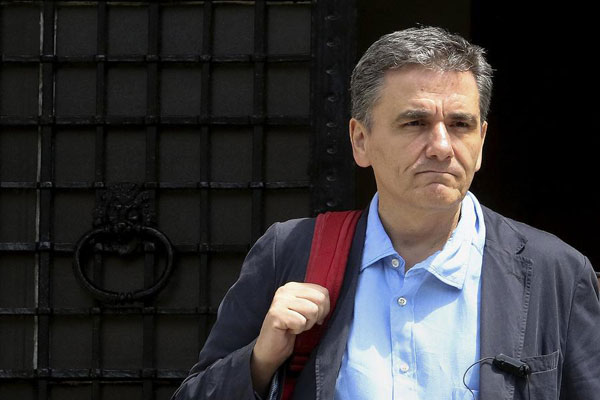Greece, lenders in stretch run to to seal new bailout
Updated: 2015-08-10 18:55
(Agencies)
|
|||||||||||
 |
|
Greek Finance Minister Euclid Tsakalotos leaves the Maximos Mansion after a meeting with Greek Prime Minister Alexis Tsipras (not pictured) in Athens, Greece August 9, 2015. [Photo/Agencies] |
ATHENS - Greece and international creditors sought to put final touches on a multi-billion euro bailout accord on Monday to keep the country financially afloat and meet an important debt repayment to the European Central Bank within days.
Greek ministers and representatives of European institutions and the International Monetary Fund resumed talks on Monday morning after a marathon session that ended in the pre-dawn hours.
An accord for up to 86 billion euros ($94.22 billion) in fresh loans to the debt-stricken nation must be in place by Aug. 20, when the repayment to the European Central Bank is due.
"From 12 midnight the two sides started the final stretch, discussing the final stretch - combing through the final text, sentence by sentence, word by word," a Greek finance ministry official said.
Greek officials earlier said they hoped to conclude negotiations with creditors by early Tuesday at the latest.
German government spokesman Steffen Seibert said on Monday a swift conclusion to the negotiations would be desirable although a thorough agreement was more important than a quick deal.
Greek officials have previously said they expect the bailout accord to be vetted by the eurogroup -- finance ministers of the euro zone -- on Aug. 14, and be approved by the Greek parliament by Aug. 18.
"When the new bailout comes to parliament for a vote it will be one bill with two articles - one article will be the loan agreement and the MoU (memorandum of understanding), and the second article will be the prior actions," another Greek official said, referring to measures Greece needs to take for the bailout accord to take effect.
The negotiations began on July 20.
Link initial aid to reform progress - Germany
In Berlin, a German finance ministry spokesman said that it would be sensible to link the size of the first tranche of aid to Athens' progress in implementing reforms.
Greek media reported that some of the prior actions included scrapping tax breaks for farmers who now receive subsidised fuel, tighter regulations on individuals owing backtaxes to the state, and a gradual increase in a "prepaid" income tax mechanism that asks taxpayers ranging from self-employed to small businesses to cough up lump tax sums on forecast income.
After a period mired in acrimony, the talks are now characterised by "outstanding cooperation" from the Greek side, a senior EU official said, with Athens keen to lock up a deal as swiftly as possible.
But the official said a major sticking point for some member states remained the size of the overall bailout, which some want reduced from the up to 86 billion agreed at the euro summit in July because of a growing taxpayer backlash against pouring money into Greece to keep it from tumbling out of the euro zone.
From the Greek side, Greek sources said a key issue of concern was how to deal with a mountain of non-performing loans in the banking sector, a factor likely to weigh on a potential recapitalisation bill for the banks.
The Greek side wants to set up a "bad bank" to handle this, while creditors want non-performing loans bundled and sold to distressed asset funds. Non-performing loans represented about 35 percent of overall loan portfolios in the first quarter of 2015, a level likely to increase because of the recent imposition of capital controls to stop a run on Greek banks.
The size of the first tranche, which is likely to be at least 20 billion euros, was also a source of some concern among lenders. Of that figure, Greece needs a 10 billion euro buffer for bank recapitalisation, 7 billion to reimburse the bridge loan for July and more than 3 billion to pay the ECB in August. ($1 = 0.9127 euros)
Related Stories
Lesson from Greece 2015-07-27 07:43
EU approves 7.16b euro bridge loan for Greece 2015-07-18 14:13
Europe moves to restore funding to Greece after bailout vote 2015-07-17 10:22
Germans lament 'disaster' in Greece talks 2015-07-15 08:00
Today's Top News
Shots fired at US consulate in Turkey as wave of attacks kill 9
Greece and lenders agree on bailout terms
Greece, lenders in stretch run to to seal new bailout
State Council approves plan to overhaul SOEs, claims report
Amazing China 2015 photo contest unveiled in Beijing
China's HK CTS Metropark buys Kew Green, manager of Brighton's Grand Hotel
Chinese companies finding credibility abroad
Sun Yang is no-show for 1,500 free final at worlds
Hot Topics
Lunar probe , China growth forecasts, Emission rules get tougher, China seen through 'colored lens', International board,
Editor's Picks

|

|

|

|

|

|






